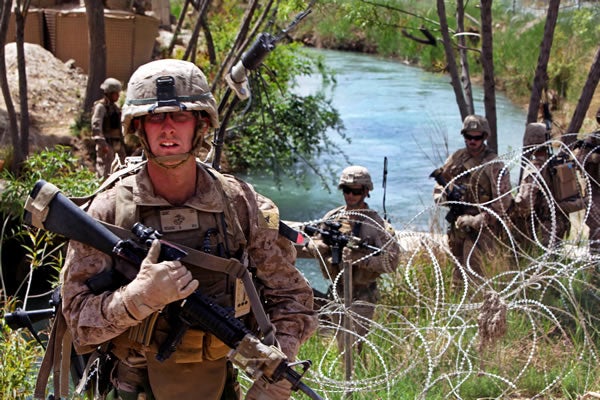From the halls of Montezuma to the shores of Tripoli, the Marine Corps has answered the nation’s call each and every time they are needed. Today, we honor the courage and sacrifice of the men and women who claim the title of United States Marine.
As the famous first lines of the Marine Corps hymn suggest, the Marines have always had a worldwide mission. Their first amphibious landing occurred in 1776 with the successful capture of Fort Nassau in the Bahamas. As the spearhead of American military power, the Marine Corps has seen its growth in prestige parallel the rise of the U.S. as a world leader.
During the hard fighting of the Battle of Belleau Woods in World War I, their German opponents called them Teufel Hunden (Devil Dogs). In the Pacific Theater during World War II, they systematically removed heavily fortified Japanese positions, island by island, in some of the most brutal action of that sanguinary conflict.
At the Battle of Chosin Reservoir in Korea, the Marines led a breakout of the surrounded United Nations forces while inflicting mass casualties on the encircling Chinese divisions. Lieutenant General Lewis Burwell “Chesty” Puller, the most decorated Marine in history, gave voice to the Marine Corps ethos when exhorting his men, “They’re on our right, they’re on our left, they’re in front of us, they’re behind us; they can’t get away from us this time!”
From the desperate fighting of the Battles of Hue and Khe Sanh during the Tet Offensive in the Vietnam War to the Battle of Fallujah in Iraq to the ongoing combat operations in the Taliban-infested Helmand Province of Afghanistan, the Marines have always acquitted themselves with the highest honor and discipline.
Today, the missions the Corps fulfills include the training of nascent security forces, disaster relief, and humanitarian aid. But as the Marines are asked to do more, they will be doing it with less manpower and resources at their disposal.
The Obama Administration’s $487 billion in cuts to the defense budget over the next 10 years will reduce the Corps by 20,000 Marines. Furthermore, sequestration could affect the procurement of the V-22 Osprey and F-35B Joint Strike Fighter, two platforms critical to the future strength of the Corps—not to mention the Navy’s ability to maintain its amphibious landing ships, one-third of which have been rated as “unsatisfactory” by Navy inspectors. The readiness of these ships could further deteriorate and seriously hamper Marine mission capability just when the Corps is shifting assets back to sea from Afghanistan.
These issues hang over the Marine Corps’s future, but today is a celebration of the glorious past and present of a quintessential American institution.
Happy birthday, Marines! Semper Fi!
Adam Yosef is currently a member of the Young Leaders Program at The Heritage Foundation. For more information on interning at Heritage, please visit http://www.heritage.org/about/departments/ylp.cfm.






























